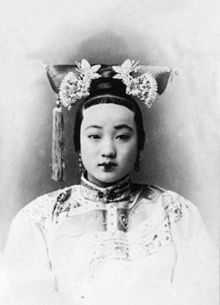Consort Zhen
| Consort Zhen | |||||
|---|---|---|---|---|---|
 | |||||
| Spouse | Guangxu Emperor | ||||
| |||||
| House |
House of Tatara (by birth) House of Aisin-Gioro (by marriage) | ||||
| Born | 27 February 1876 | ||||
| Died | 15 August 1900 (aged 24) | ||||
Consort Zhen (Chinese: 珍妃; pinyin: zhēn fēi) posthumously known as Imperial Noble Consort Keshun (Chinese: 恪顺皇贵妃), popularly, but incorrectly, known as the "Pearl Concubine", was a concubine of the Guangxu Emperor (1871–1908) of the Qing Dynasty in China.
Biography
Known as Lady Tatara (他他拉氏), she was the daughter of Changxu of the Tatara clan and younger sister of Consort Jin (1874–1924) who was also a concubine of the Guangxu Emperor. She was born in the second year of the reign of Guangxu and lived from 27 February 1876 to 15 August 1900.
Consort Zhen was the favourite consort of the Guangxu Emperor. She entered the Forbidden City in 1888. Soon after that, on 25 February 1889, she was granted the title of "Concubine Zhen."
At the beginning, Empress Dowager Cixi very much appreciated Consort Zhen's talents, and she hired China's top artisans to teach her painting and playing musical instruments. However, Consort Zhen urged the Guangxu Emperor to be "strong and independent," and encouraged his attempts to introduce political reform and the teaching of foreign languages. It was also said that Consort Zhen liked photography, and she invited westerners into the Forbidden City to learn more about it. This explains the large number of extant photographs of Consort Zhen, an unusual occurrence for a consort. Her association with foreign customs, in addition to her peculiar habit of dressing in men's clothes, inspired even more disdain from Empress Dowager Cixi. Once, in response to her arrogant attitude, Cixi teased Consort Zhen by calling her "Grandma Zhen."
Apparently she also antagonized the dowager empress when it was discovered that she had abused her influence over the emperor by interfering in regular procedures for civil appointments. The transactions became public in November 1894, during the First Sino-Japanese War, resulting in a series of embarrassing public scandals for the imperial court.[1] In retaliation, Cixi had Zhen and her sister Jin, who had also been implicated, degraded, a eunuch collaborator executed, and a courtier named Zhi Rui, a cousin of the concubines, banished from the capital.[2]
Zhen and Jin were eventually restored to their positions, but it seems that Zhen was excluded from court functions by the middle of 1896 and was eventually placed under house arrest.[3]
During the invasion of the Eight-Nation Alliance in 1900, the Qing imperial court fled the Forbidden City to Xi'an. Empress Dowager Cixi ordered Consort Zhen to be taken out of the prison and brought in front of her. Cixi allegedly said: "I originally planned to bring you along with us. But you are young and pretty, and are likely to be raped by the foreign soldiers on the way. I trust you know what you should do." Realizing that Empress Dowager Cixi meant to order her to commit suicide, Consort Zhen begged Cixi to allow the Guangxu Emperor to stay in Beijing and negotiate with the foreign powers. Infuriated with her, Empress Dowager Cixi finally ordered Consort Zhen to be thrown into a well behind the Ningxia Palace in the north-eastern part of the Forbidden City.
However, according to Sterling Seagrave, this dramatic story was invented by writer Edmund Backhouse, who was responsible for many of the myths about the empress. In actuality, Cixi left Peking before 14 August. Seagrave says Consort Zhen's fate is unknown, but it is possible that she "was done in by the eunuchs on their own initiative, or flung herself down the well."
See also
- Ranks of Imperial Consorts in China#Qing
- Qing Dynasty nobility
References
External links
| Wikimedia Commons has media related to Imperial Consort Zhen. |